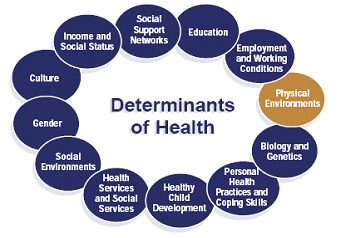 This feels encouraging: Two Viewpoint articles in a recent issue of JAMA (The Journal of the American Medical Association) on improving population health (both behind a paywall, unfortunately).
This feels encouraging: Two Viewpoint articles in a recent issue of JAMA (The Journal of the American Medical Association) on improving population health (both behind a paywall, unfortunately).
Population health
What is population health? Apparently it depends on who you ask. If you ask those with a financial stake in the health care delivery system, population health means improving the health of patients who currently use (i.e., pay for) the system. You get a different answer if you ask those involved in public health, community development, or social services. They believe “population” should include everyone in the entire geographic community, whether or not those individuals are able to use or benefit from health care services. They also believe “health” should include quality of life and economic well-being – measures that prevent disease in the first place – and not just conditions addressed by the medical model of disease.
What I especially liked about Stephen Shortell’s article – Bridging the Divide between Health and Health Care – was its economic realism. I dearly wish that those with a financial interest in the health care industry, as well as politicians who control health policy, would acknowledge that the way to improve health is to address its social determinants. But trying to change the hearts and minds of stakeholders is like pushing against the tide.
Shortell’s approach appeals to the profit motive. He cites the example of the Cambridge Health Alliance. At this health care system in the Boston area, community health workers reduced childhood asthma, resulting in a return on investment (from fewer hospital admissions and emergency department visits) of $4 for every $1 invested. “To create a culture of health will require creating a market for health, moving away from the current market for treating disease.”
As Orwell warned, choose your language with care
Population health is up for discussion these days because the Affordable Care Act (ACA) – which goes into effect next year — provides $10 billion over 10 years to improve population health (by preventing disease and promoting health, presumably). One mechanism to accomplish this goal is the creation of new funding models such as Accountable Care Organizations (ACOs). ACOs have three goals: to control the cost of health care, to improve the quality of health care, and to improve population health.
As Douglas Noble and Lawrence Casalino point out in their JAMA article — Can Accountable Care Organizations Improve Population Health? Should They Try? — there is only one brief reference to “population” in the entire ACA (906 pages), namely, the Medicare Shared Savings ACO program must promote “accountability for a patient population.” Given this particular context, it would be easy to interpret “population” as those patients enrolled in the ACO, rather than residents in the geographic area the ACO serves.
Noble and Casalino are concerned that a narrow interpretation of population health – improving medical care for a specific group of patients — will divert attention from both public health/social services and the socioeconomic factors that determine health. “It would be unfortunate if ACOs, which have been conceived in idealistic terms, were to result in a narrowing and medicalization of the phrase ‘population health.’”
The authors mention possible incentives that might motivate ACOs to address population health in the broad sense of that term. Their main concern in this article, however, is their fear that the very meaning of the term will be lost.
From personal responsibility to population health
Despite the causes for concern raised by these authors, I find that the mere publication of their viewpoints in JAMA is encouraging. It was not that long ago (2010) that a highly respected health care expert, Robert H. Brook, wrote in a JAMA commentary: “Should [health] insurance be more costly, or even withdrawn, not because individuals become sick but because they do not use preventive services or evidence-based care in a manner that both protects their health and reduces health care costs for others. … [W]hat kind of penalty for misuse would be ethically and morally acceptable?”
In a subsequent exchange of letters to the editor, Brook displayed – more or less successfully — his history of appreciating the importance of the social determinants of health. He proposed, for example, that penalizing only the middle and upper classes might save money that could then be used to “change the environment and reduce the effect of social determinants for everyone.”
I’m hoping that what I sense in 2013 is a change in attitude towards population health among medical professionals. Shortell concludes his article:
Like a hologram in which the whole is embedded in each part, health care delivery is embedded into population health and population health is embedded into health care delivery. It is now the responsibility of clinicians and health care delivery organizations to help maintain the health of the community and the responsibility of the community to help maintain the health of the individual.
May the dialogue continue.
Related posts:
Healthy lifestyles: Social class. A precarious optimism
Healthy lifestyles: The unfortunate consequences
Healthy lifestyles: The antecedents
On healthism, the social determinants of health, conformity, & embracing the abnormal: (3) Connections
What is healthism? (part two)
References:
Douglas J. Noble, MD, MPH and Lawrence P. Casalino, MD, PhD, Can Accountable Care Organizations Improve Population Health? Should They Try?, JAMA, March 20, 2013, Vol 309, No. 11
Stephen M. Shortell, PhD, MPH, MBA, Bridging the Divide between Health and Health Care, JAMA, March 20, 2013, Vol 309, No. 11
Robert H. Brook, MD, ScD, Rights and Responsibilities in Health Care: Striking a Balance, JAMA, June 9, 2010, Vol 202, No 22
Robert H. Brook, MD, ScD, Balancing Responsibilities in Health Care—Reply, JAMA, September 15, 2010, Vol 304, No 11
For one explanation of the term population health, see this Wikipedia entry


Sorry, comments are closed for this post.